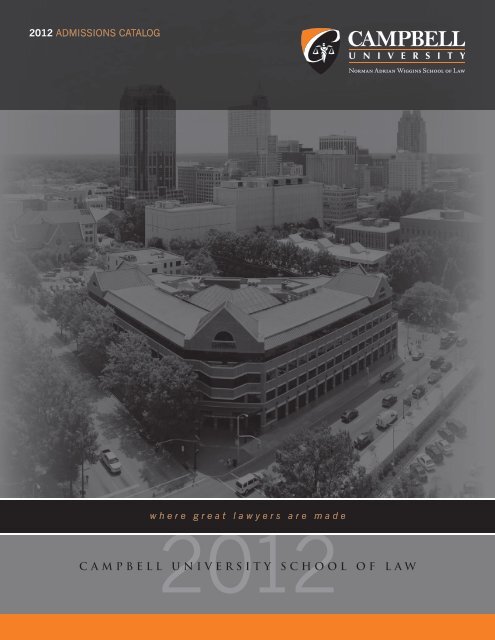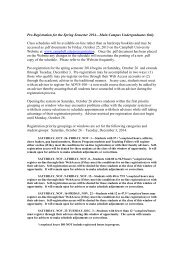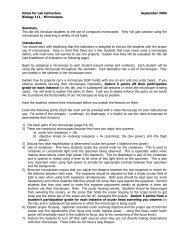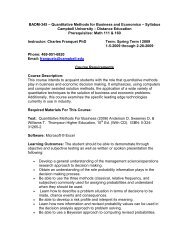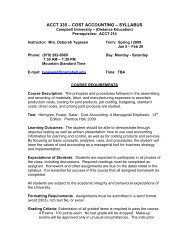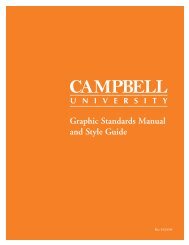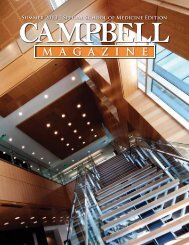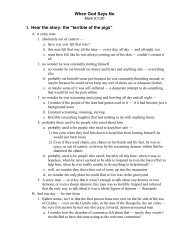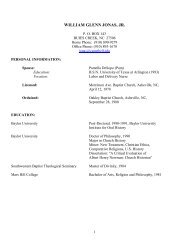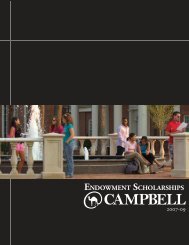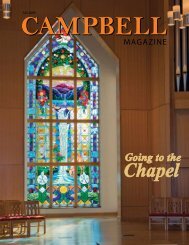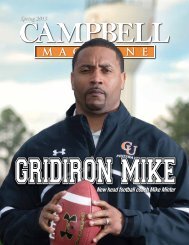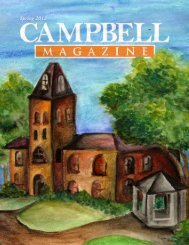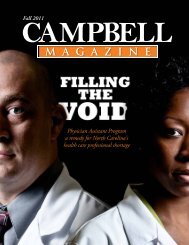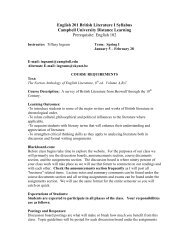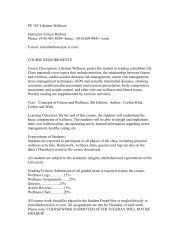download our academic course curriculum - Campbell Law School
download our academic course curriculum - Campbell Law School
download our academic course curriculum - Campbell Law School
Create successful ePaper yourself
Turn your PDF publications into a flip-book with our unique Google optimized e-Paper software.
2012 ADMISSIONS CATALOG<br />
where great lawyers are made<br />
2012<br />
CAMPBELL UNIVERSITY SCHOOL OF LAW
OUR VISION<br />
<strong>Campbell</strong> <strong>Law</strong> <strong>School</strong> is a HIGHLY DEMAND-<br />
ING, PURPOSELY SMALL AND INTENSELY<br />
PERSONAL COMMUNITY of faculty and<br />
students whose aim, guided by transcendent values,<br />
is to develop lawyers who possess moral conviction,<br />
social compassion and professional competence<br />
and who view the practice of law as a calling to<br />
serve others and to create a more just society.<br />
The founding vision of <strong>Campbell</strong> <strong>Law</strong> <strong>School</strong> was a<br />
distinctive program based on limited enrollment,<br />
EXTENSIVE STUDENT OPPORTUNITIES<br />
FOR INTERACTION WITH FACULTY and rigorous<br />
intellectual and professional development.<br />
Since 1976, the <strong>Law</strong> <strong>School</strong> has continuously prepared<br />
its graduates to serve their communities with<br />
legal skill and ethical and intellectual leadership—<br />
living up to the noblest tradition of the counselor.<br />
Our vision is realized through a DEMANDING<br />
ACADEMIC PROGRAM that holds students to<br />
the highest expectations in thinking, preparation<br />
and application. Students are challenged to make<br />
relevant and valid judgments, to discriminate<br />
among values and maintain the highest standards<br />
of professional excellence. Small classes and a<br />
supportive intellectual community help to develop<br />
lawyers of STRONG MORAL CHARACTER<br />
with disciplined and creative minds.<br />
Combining <strong>our</strong> rigorous <strong>academic</strong> program with<br />
comprehensive skills training in trial and appellate<br />
advocacy, legal writing, planning, negotiation and<br />
client counseling, we bring together the theoretical<br />
and practical to produce PRACTICE-READY<br />
LAWYERS.<br />
We produce highly competent, deeply compassionate<br />
lawyers who see the practice of law as a<br />
CALLING TO SERVE OTHERS and promote<br />
the understanding that reconciling differences is as<br />
important as winning cases. Our graduates become<br />
effective advocates locally and throughout the world<br />
for transformative legal and social justice, helping<br />
those most in need.<br />
We enc<strong>our</strong>age <strong>our</strong> students to examine the relationship<br />
between SPIRITUAL AND LEGAL<br />
ISSUES, to explore the theological foundations<br />
for law and to consider how we can help achieve a<br />
more just and merciful society. We recognize the<br />
immeasurable dignity and worth of every person in<br />
a congenial <strong>academic</strong> environment where everyone<br />
is treated with kindness, civility and respect. We<br />
welcome students from all faiths and secular moral<br />
traditions, and are committed to FREE AND<br />
OPEN DISCUSSION OF IDEAS.
TABLE OF CONTENTS<br />
MESSAGE FROM THE DEAN....................................... 1<br />
ACADEMIC PROGRAM.............................................. 3<br />
FACULTY & ADMINISTRATION.................................... 7<br />
STUDENTS............................................................ 8<br />
CALLING TO SERVE OTHERS..................................... 9<br />
CHRISTIAN PERSPECTIVE ON LAW AND JUSTICE..........10<br />
ADVOCACY PROGRAM.............................................11<br />
CAREER AND PROFESSIONAL DEVELOPMENT...............12<br />
LIVING IN RALEIGH...............................................13<br />
STUDENT PUBLICATIONS AND ORGANIZATIONS...........15<br />
FINANCIAL AID & COST..........................................17<br />
ADMISSIONS........................................................18
message from<br />
THE DEAN<br />
GREETINGS:<br />
Giving consideration to attend law school is a<br />
significant life decision. A career in the law will open<br />
unlimited possibilities, but it also requires hard<br />
work, dedication, and desire to serve others with<br />
y<strong>our</strong> talents and abilities. There are many choices<br />
of law schools, but I firmly believe there is no place<br />
that will better prepare you to be a successful<br />
lawyer and leader than <strong>Campbell</strong> <strong>Law</strong> <strong>School</strong>.<br />
From the moment you walk in the door at <strong>Campbell</strong><br />
<strong>Law</strong>, you will experience a friendly and open<br />
institution where everyone shares knowledge and<br />
celebrates individual and collective success.<br />
Inside <strong>our</strong> classrooms, <strong>our</strong> open door approach provides<br />
you access to some of the most engaging and<br />
experienced legal educators. Unlike what you will<br />
find at most law schools, the vast majority of <strong>our</strong><br />
full-time faculty have actually practiced law—<br />
they understand the theoretical and practical<br />
aspects of the law. Additionally, <strong>our</strong> adjunct faculty<br />
—which includes several federal judges, members<br />
of the North Carolina Supreme C<strong>our</strong>t and C<strong>our</strong>t of<br />
Appeals, and attorneys from some of the region’s<br />
most respected law firms—are second to none.<br />
The synergy between students and faculty is the<br />
basis of relationships that transcend office h<strong>our</strong>s,<br />
and contributes to one of the most <strong>academic</strong>ally<br />
challenging and rewarding legal educations<br />
available today.<br />
At the same time, we are guided by a Christian<br />
perspective through which you will find the freedom<br />
to open both y<strong>our</strong> mind and heart to not only learning<br />
the law, but applying it justly and in service<br />
to others.<br />
Outside the walls of <strong>Campbell</strong> <strong>Law</strong> <strong>School</strong>, the<br />
legal, government, and business communities of<br />
Raleigh and the entire region open their doors to<br />
you with unmatched opportunities to learn and gain<br />
first-hand experience.<br />
At <strong>Campbell</strong> <strong>Law</strong>, doors are always opening for <strong>our</strong><br />
students and graduates.<br />
Very best regards,<br />
Melissa A. Essary<br />
Dean and Professor of <strong>Law</strong><br />
Norman Adrian Wiggins <strong>School</strong> of <strong>Law</strong><br />
<strong>Campbell</strong> University<br />
page 1<br />
2012 ADMISSIONS CATALOG
Students are challenged to make relevant and valid judgments,<br />
to discriminate among values and maintain the highest standards<br />
of professional excellence.<br />
Woody Woodruff, Professor of <strong>Law</strong><br />
Small classes and a supportive intellectual community help to develop<br />
lawyers of strong moral character with disciplined and creative minds.<br />
2012 ADMISSIONS CATALOG page 2
OUR ACADEMIC PROGRAM<br />
<strong>Campbell</strong> <strong>Law</strong> <strong>School</strong> holds students to the highest standards<br />
of thinking, writing and speaking. The <strong>curriculum</strong><br />
demands that students routinely make relevant and valid<br />
judgments, integrate values and maintain the highest<br />
standards of professional excellence.<br />
The <strong>curriculum</strong>’s challenging nature also stems from <strong>our</strong><br />
commitment to a professional legal education, combining<br />
theoretical inquiry with practical skills development.<br />
To accomplish this goal, <strong>our</strong> c<strong>our</strong>se of instruction<br />
is exceptionally rigorous. Success results from students<br />
analyzing the law, constructing and evaluating legal<br />
arguments, and resolving legal problems.<br />
<strong>Campbell</strong>’s program provides students with comprehensive<br />
skills training in planning, counseling, negotiation,<br />
legal drafting, trial and appellate advocacy, and alternative<br />
forms of dispute resolution.<br />
To succeed at <strong>Campbell</strong> <strong>Law</strong> <strong>School</strong> students must<br />
work hard, but they are supported by <strong>our</strong> small class<br />
sizes and <strong>our</strong> faculty’s dedication to mentoring students.<br />
Graduates appreciate the <strong>academic</strong> demands as<br />
they enter the practice of law, confident that they are<br />
fully prepared for a successful legal career.<br />
THE CURRICULUM that follows is required of all law students. Additional requirements for<br />
students pursuing the advocacy, business, or intellectual property tracks, as well as students<br />
not electing a track, are also explained below. All students must complete a total of 90 h<strong>our</strong>s<br />
for graduation.<br />
CORE J.D. TRACK<br />
FIRST YEAR COURSES—<br />
BUILDING A SOLID<br />
FOUNDATION<br />
Fall Semester (15 h<strong>our</strong>s)<br />
Civil Procedure I<br />
Contracts I<br />
Criminal <strong>Law</strong><br />
Professional Skills -<br />
Research/Writing<br />
Property I<br />
Torts I<br />
Spring Semester (15 h<strong>our</strong>s)<br />
Civil Procedure II<br />
Constitutional <strong>Law</strong> I<br />
Contracts II<br />
Professional Skills - Advocacy<br />
Property II<br />
Torts II<br />
The Professionalism<br />
Lecture Series<br />
Required of all first year students,<br />
this program brings in leading<br />
legal scholars and practitioners<br />
from across the region and nation<br />
to heighten student awareness of<br />
professional responsibility, and to<br />
illustrate the highest principles of<br />
integrity and dedication to the legal<br />
profession and the public.<br />
UPPER LEVEL REQUIRED<br />
COURSES—DEVELOPING<br />
THEORETICAL INQUIRY AND<br />
PRACTICAL SKILLS<br />
Students may enroll in upper level<br />
required c<strong>our</strong>ses and requirements<br />
any time after the first year, subject<br />
to prerequisites.<br />
Business Organizations<br />
Constitutional <strong>Law</strong> II<br />
Criminal Procedure<br />
Evidence<br />
Jurisprudence Requirement<br />
Perspective Requirement<br />
Planning Requirement<br />
Professional Responsibility<br />
and Ethics<br />
Sales and Leasing<br />
Secured Transactions<br />
Trial Advocacy<br />
Wills and Trusts<br />
Jurisprudence Requirement<br />
Fulfilled by successful completion<br />
of one of the following c<strong>our</strong>ses:<br />
Christian Perspectives on Legal<br />
Thought<br />
Culture, <strong>Law</strong> & Philosophy<br />
Foundations of <strong>Law</strong><br />
Introduction to Legal Theory:<br />
Persons and the <strong>Law</strong><br />
Readings in Jurisprudence<br />
Theology & the <strong>Law</strong><br />
Perspective Requirement<br />
Fulfilled by successful completion<br />
of one of the following c<strong>our</strong>ses:<br />
Advanced Ethics Seminar<br />
Capital Jurisprudence<br />
Christian Perspectives<br />
Constitutional History<br />
First Amendment Seminar<br />
Great Trials<br />
Judicial Process<br />
<strong>Law</strong> & Literature<br />
<strong>Law</strong>, Culture & Policy<br />
Leading Lives that Matter<br />
Readings in Jurisprudence<br />
Significant <strong>School</strong> Decisions<br />
Theology & the <strong>Law</strong><br />
Note: Completion of two Jurisprudence<br />
classes will fulfill the<br />
Perspective and Jurisprudence<br />
requirements.<br />
Planning Requirement<br />
Students who do not elect either<br />
the Business or Advocacy Track<br />
must take, in addition to the required<br />
c<strong>our</strong>ses, one of the following<br />
planning c<strong>our</strong>ses:<br />
Business Planning<br />
Common Interest Communities<br />
Contract Planning<br />
Estate Planning<br />
page 3<br />
2012 ADMISSIONS CATALOG
Family <strong>Law</strong> Planning<br />
Real Property Planning<br />
Students pursuing the core J.D.<br />
Track must also take either<br />
Advanced Trial and Appellate<br />
Advocacy or Pre-Trial Litigation.<br />
ELECTIVE TRACKS<br />
In addition to the core track,<br />
students may choose to pursue<br />
more focused elective c<strong>our</strong>ses of<br />
study concentrating on advocacy,<br />
business or intellectual property.<br />
ADVOCACY TRACK<br />
In addition to the required<br />
<strong>curriculum</strong>, students who elect<br />
the Advocacy Track must take<br />
the following c<strong>our</strong>ses:<br />
Advance Trial and Appellate<br />
Advocacy<br />
Pre-Trial Litigation<br />
Advocacy track students must also<br />
take an additional eight h<strong>our</strong>s of<br />
credit from the following c<strong>our</strong>ses:<br />
ADR/Mediation<br />
Civil Rights Litigation<br />
Criminal Trial Practice<br />
Government Litigation<br />
Insurance <strong>Law</strong><br />
Jury Selection<br />
<strong>Law</strong> and Medicine<br />
Negotiations<br />
North Carolina Criminal<br />
Procedure<br />
Products Liability<br />
Remedies<br />
Scientific Evidence<br />
BUSINESS TRACK<br />
In addition to the required<br />
<strong>curriculum</strong>, students who elect the<br />
Business Track must take each of<br />
the following c<strong>our</strong>ses:<br />
Income Tax<br />
Contract Planning or Business<br />
Planning<br />
Taxation of Business Entities<br />
Securities Regulation<br />
<strong>Law</strong> and Accounting – or<br />
Competency Equivalent<br />
Corporate Finance or<br />
Franchise <strong>Law</strong><br />
International/Comparative<br />
Business <strong>Law</strong> Requirement<br />
International Business<br />
Transactions<br />
International Trade <strong>Law</strong><br />
Comparative Business <strong>Law</strong><br />
Business Track students must<br />
also take at least two of the<br />
following c<strong>our</strong>ses:<br />
Antitrust<br />
Bankruptcy<br />
Business Planning/Contract<br />
Planning<br />
Corporate Finance or<br />
Franchise <strong>Law</strong><br />
Employment <strong>Law</strong><br />
Intellectual Property<br />
Limited Liability Companies<br />
Non-profit Organizations<br />
INTELLECTUAL<br />
PROPERTY TRACK<br />
In addition to the required <strong>curriculum</strong>,<br />
students who elect the<br />
Intellectual Property Track must<br />
take the following c<strong>our</strong>se:<br />
Introduction to Intellectual<br />
Property<br />
Intellectual Property Track students<br />
must also take at least f<strong>our</strong> of the<br />
following c<strong>our</strong>ses:<br />
Copyright <strong>Law</strong><br />
IP Litigation<br />
IP and Technology Transactions<br />
and Licensing<br />
Media & Entertainment <strong>Law</strong><br />
Patent <strong>Law</strong><br />
Patent Prosecution<br />
Trademark and Unfair<br />
Competition <strong>Law</strong><br />
“The best thing about <strong>Campbell</strong> <strong>Law</strong> is knowing<br />
that when I graduate I’ll be prepared to<br />
pursue my dreams and take advantage of any<br />
opportunity that comes my way. I know that<br />
no matter where I end up working, I will be<br />
a better attorney and a better person because<br />
I went to <strong>Campbell</strong> <strong>Law</strong>.”<br />
JENA EDELMAN,<br />
CLASS OF 2011<br />
In addition, students must take<br />
two of the following c<strong>our</strong>ses:<br />
Advanced Trial Litigation<br />
Any International or<br />
Comparative Business c<strong>our</strong>se<br />
(2 credit minimum)<br />
Antitrust<br />
Bankruptcy<br />
Contract Planning<br />
Client Counseling<br />
Estate Tax<br />
Federal C<strong>our</strong>ts<br />
First Amendment<br />
Mergers & Acquisitions<br />
Personal Tax<br />
Pre-Trial Litigation<br />
Scientific Evidence<br />
Sports <strong>Law</strong><br />
“There is no question that <strong>Campbell</strong> <strong>Law</strong> is<br />
hard. But I really feel like all the challenges<br />
that the classes and c<strong>our</strong>sework present are<br />
going to prepare me to be a great lawyer.”<br />
ALKA SRIVASTAVA,<br />
CLASS OF 2011<br />
2012 ADMISSIONS CATALOG page 4
OUR ACADEMIC PROGRAM<br />
COURSE OFFERINGS<br />
Administrative <strong>Law</strong><br />
Admiralty<br />
Advanced Ethics Seminar<br />
Advanced Real Property<br />
Advanced Trial and Appellate<br />
Advocacy<br />
Animal <strong>Law</strong><br />
Antitrust<br />
Appellate Advocacy<br />
Bankruptcy<br />
Business Organizations<br />
Business Planning<br />
Christian Perspectives on<br />
Legal Thought<br />
Civil Procedure<br />
Civil Rights Litigation<br />
Common Interest<br />
Communities Seminar<br />
Conflict of <strong>Law</strong>s<br />
Constitutional History:<br />
The Roots of Civil Rights,<br />
1770-1900<br />
Constitutional <strong>Law</strong> I & II<br />
Consumer <strong>Law</strong><br />
Contract Planning<br />
Contracts I & II<br />
Copyright <strong>Law</strong><br />
Corporate Finance<br />
Corporate Practical Skills<br />
Corporate Reorganization<br />
Seminar<br />
Corporations: Formation to<br />
Major Transactions<br />
Criminal Appellate Issues<br />
Criminal <strong>Law</strong><br />
Criminal Procedure<br />
Criminal Trial Practice<br />
Culture, <strong>Law</strong>, Religion<br />
and Philosophy<br />
Current Appellate Issues<br />
Education <strong>Law</strong> Seminar<br />
Elder <strong>Law</strong>/Senior <strong>Law</strong> Clinic<br />
Employment <strong>Law</strong><br />
Entertainment and Sports <strong>Law</strong><br />
Environmental <strong>Law</strong><br />
Estate Administration<br />
Estate and Gift Taxation<br />
Estate Planning<br />
Evidence<br />
Externships<br />
Family <strong>Law</strong><br />
Family <strong>Law</strong> Planning<br />
Federal C<strong>our</strong>ts<br />
Federal Crimes Seminar<br />
Federal Criminal and Civil<br />
Practice<br />
First Amendment Seminar<br />
Franchise <strong>Law</strong><br />
Government Litigation<br />
Great Trials<br />
Health <strong>Law</strong><br />
History of Common <strong>Law</strong><br />
Immigration and Refugee<br />
<strong>Law</strong> and Practice<br />
Income Taxation<br />
Insurance <strong>Law</strong><br />
Intellectual Property<br />
Intellectual Property Licensing<br />
Intellectual Property Litigation<br />
International Business<br />
Transactions<br />
International Trade <strong>Law</strong><br />
Interviewing, Counseling and<br />
Decision Making<br />
Interviewing, Counseling and<br />
Decision Making Seminar<br />
Introduction to Antitrust,<br />
Trademark and Franchising<br />
Introduction to Legal Theory<br />
Judicial Process<br />
Judicial Writing<br />
Jurisprudence/Foundations<br />
of <strong>Law</strong><br />
Juvenile <strong>Law</strong><br />
Juvenile Mediation Project<br />
(Classroom)<br />
Juvenile Mediation Project<br />
(Clinical)<br />
<strong>Law</strong> and Accounting<br />
<strong>Law</strong> and Economics<br />
<strong>Law</strong> and Medicine<br />
<strong>Law</strong> and Public Policy<br />
<strong>Law</strong>, Culture and Policy<br />
<strong>Law</strong>, <strong>Law</strong>yers and Literature<br />
<strong>Law</strong> Practice and Management<br />
<strong>Law</strong>yer as a Public Citizen<br />
Leading Lives That Matter<br />
Limited Liability Companies<br />
and Non Profit<br />
Local Government <strong>Law</strong><br />
Mediation Advocacy<br />
Mergers and Acquisitions<br />
Military Justice <strong>Law</strong><br />
National Security <strong>Law</strong><br />
Negotiations<br />
Non-Profit Organizations: Legal<br />
Issues and Representation<br />
North Carolina<br />
Constitutional <strong>Law</strong><br />
North Carolina Criminal<br />
Procedure<br />
North Carolina Motor<br />
Vehicle <strong>Law</strong><br />
Ocean and Coastal <strong>Law</strong><br />
Patent <strong>Law</strong><br />
Patent Litigation<br />
Patent Preparation and<br />
Prosecution<br />
Payment Systems<br />
Pre-Trial Litigation<br />
Products Liability<br />
Professional Responsibility and<br />
Ethics<br />
Professional Skills Advocacy<br />
Professional Skills - Legal<br />
Research/Legal Writing<br />
Professionalism Lecture Series<br />
Property I & II<br />
Public International <strong>Law</strong><br />
Readings in Jurisprudence<br />
Real Property Planning<br />
Redistricting, Voting Rights and<br />
Election <strong>Law</strong><br />
Regulatory <strong>Law</strong> and Policy<br />
Remedies<br />
Sales and Leasing<br />
Scientific Evidence<br />
Secured Transactions<br />
Securities Regulation<br />
Significant <strong>School</strong> Decisions<br />
Seminar<br />
Social Security Disability <strong>Law</strong><br />
Start Y<strong>our</strong> Own <strong>Law</strong> Firm<br />
State Legislative Policy/Ethics<br />
Taxation of Business Entities<br />
Theology and The <strong>Law</strong><br />
Torts I & II<br />
Trial Advocacy<br />
Virginia Code Pleading<br />
Wills and Trusts<br />
Workers’ Compensation<br />
<strong>Campbell</strong> <strong>Law</strong> <strong>School</strong> offers students a wide variety of c<strong>our</strong>ses.<br />
Specific c<strong>our</strong>se descriptions are listed online at www.law.campbell.edu.<br />
C<strong>our</strong>se offerings are subject to change.<br />
page 5<br />
2012 ADMISSIONS CATALOG
COMBINED DEGREE OPTIONS<br />
The Juris Doctor and Master of<br />
Public Administration Program<br />
The JD/MPA program is a<br />
dual degree offered through<br />
<strong>Campbell</strong> <strong>Law</strong> <strong>School</strong> and North Carolina State<br />
University. This program enables students to earn<br />
both degrees in f<strong>our</strong> years of full-time study. If pursued<br />
separately, it would take five years to complete the<br />
two programs. Recipients of the JD/MPA will possess<br />
professional credentials for a diverse range of careers<br />
in law, government, nonprofit management, teaching,<br />
and research.<br />
For admission to the JD/MPA program, students must<br />
apply and be accepted to both programs separately.<br />
Candidates who are admitted will typically complete the<br />
first year at <strong>Campbell</strong> <strong>Law</strong>, the second year at NC State,<br />
and the third and f<strong>our</strong>th years will be divided between<br />
the two schools to maximize c<strong>our</strong>se availability. Students<br />
who are already in their first year of the MPA program<br />
may reverse this admissions procedure if they are admitted<br />
into <strong>Campbell</strong> <strong>Law</strong> for the subsequent year. Similarly,<br />
students already in their first year of law school<br />
may apply for admission into the MPA program.<br />
The Juris Doctor and Master of Business<br />
Administration Program<br />
<strong>Campbell</strong> <strong>Law</strong> <strong>School</strong> and NC State University’s Jenkins<br />
Graduate <strong>School</strong> of Management have partnered to offer<br />
a JD/MBA enabling students to earn both degrees in<br />
f<strong>our</strong> years of full-time study, rather than the usual five.<br />
Recipients of the JD/MBA have attained professional<br />
credentials for a diverse range of careers in business,<br />
finance, law, government, nonprofit organizations, teaching,<br />
and research. The program of study is flexible and<br />
individualized to provide each student with the best<br />
feasible combination of these two disciplines. Students<br />
completing the JD/MBA will be well positioned to contribute<br />
to effective governance in North Carolina and<br />
beyond, adding capacity to identify and solve problems<br />
facing both states and communities.<br />
The Juris Doctor and Master of Business<br />
Administration Program<br />
Offered through a cooperative<br />
arrangement between <strong>Campbell</strong><br />
<strong>Law</strong> <strong>School</strong> and <strong>Campbell</strong> University’s Lundy-Fetterman<br />
“There is no question that anything I have<br />
accomplished in my professional life is directly<br />
attributable to <strong>Campbell</strong> <strong>Law</strong> <strong>School</strong>. I was<br />
in one of the early graduating classes (‘82).<br />
Now, as Deputy Managing Partner and<br />
Head of Litigation of a 900-lawyer firm with<br />
20 offices in the U.S. and abroad, I understand<br />
and appreciate that the work ethic, professionalism and determination<br />
that was instilled in me at <strong>Campbell</strong> has allowed me<br />
to move through the ranks of one of the nation’s largest law firms.”<br />
TERRY BAGLEY, CLASS OF 1982,<br />
DEPUTY MANAGING PARTNER/<br />
HEAD OF LITIGATION,<br />
MCGUIREWOODS LLP<br />
MEMBER, LAW SCHOOL BOARD OF VISITORS<br />
<strong>School</strong> of Business, the JD/MBA program offers students<br />
a dynamic joint degree program whereby they can obtain<br />
their law degree and a Master of Business Administration<br />
within a three-year period.<br />
This program is designed to help students have a solid<br />
grounding in the law and the latest business management<br />
practices. Individuals who graduate with a JD/MBA<br />
will be ready to move into a wide variety of administrative<br />
or executive roles within the corporate, legal,<br />
government or nonprofit communities.<br />
The Juris Doctor and Master of Trust The JD/MTWM is<br />
and Wealth Management Program<br />
the only program<br />
Also offered through a cooperative of its kind in the<br />
arrangement between <strong>Campbell</strong> <strong>Law</strong> United States.<br />
<strong>School</strong> and <strong>Campbell</strong> University’s<br />
Lundy-Fetterman <strong>School</strong> of Business, the JD/MTWM<br />
program provides the necessary skill sets for obtaining<br />
positions in the wealth management field. Graduates of<br />
<strong>Campbell</strong>’s Trust and Wealth Management Program are<br />
recognized nationwide for having the hands-on training,<br />
people skills, and technical expertise to take their place<br />
as leaders in the financial services industry.<br />
The MTWM Program is registered with the Certified<br />
Financial Planner Board of Standards, Inc. and graduates<br />
of the program are eligible to sit for the national Certified<br />
Financial Planner Board of Standards Inc. (CFP®) Certification<br />
Examinations and earn the certification. The<br />
JD/MTWM program can be completed in three years.<br />
2012 ADMISSIONS CATALOG page 6
OUR FACULTY & ADMINISTRATION<br />
<strong>Campbell</strong> <strong>Law</strong> <strong>School</strong>’s faculty is a community of<br />
scholars who make teaching their priority. They are<br />
readily accessible and serve students as mentors,<br />
coaches and professional role models.<br />
All faculty have open-door office policies and are<br />
available to consult regularly with students on an<br />
individual basis. Our professors are deeply committed<br />
to the search for knowledge through meaningful legal<br />
scholarship, but never at the expense of their devotion<br />
to the <strong>academic</strong> success and professional development<br />
of each student.<br />
MELISSA A. ESSARY<br />
Dean and Professor of <strong>Law</strong><br />
BJ, University of Texas<br />
JD, Baylor University<br />
RICHARD T. BOWSER<br />
Associate Professor of <strong>Law</strong><br />
BA, Grove City College<br />
MA, Westminster Theological<br />
Seminary<br />
JD, <strong>Campbell</strong> University<br />
BOBBI JO BOYD<br />
Assistant Professor of <strong>Law</strong><br />
BS, Western Carolina<br />
University<br />
JD, University of North<br />
Carolina at Chapel Hill<br />
J. BRYAN BOYD<br />
Associate Dean for<br />
Academic Affairs<br />
Assistant Professor of <strong>Law</strong><br />
BA, Mars Hill College<br />
JD, <strong>Campbell</strong> University<br />
MARY-CHARLES BRANCH<br />
Director of Student Life &<br />
Pro Bono<br />
BA, University of North<br />
Carolina at Chapel Hill<br />
JD, <strong>Campbell</strong> University<br />
LYNN R. BUZZARD<br />
Professor of <strong>Law</strong><br />
BA, MATM, Divinity,<br />
Duke University<br />
JD, DePaul University<br />
JEAN M. CARY<br />
Professor of <strong>Law</strong><br />
BA, Duke University<br />
JD, Georgetown University<br />
JOHNNY C. CHRISCOE, JR.<br />
Associate Professor of <strong>Law</strong><br />
BA, Pembroke State University<br />
JD, <strong>Campbell</strong> University<br />
MARGARET PERSON CURRIN<br />
Professor of <strong>Law</strong><br />
AB, Meredith College<br />
JD, <strong>Campbell</strong> University<br />
B. KEITH FAULKNER<br />
Vice Dean<br />
BS, Charleston Southern<br />
University<br />
MBA, <strong>Campbell</strong> University<br />
JD, <strong>Campbell</strong> University<br />
AMY FLANARY-SMITH<br />
Director of the Legal Research<br />
and Writing Program<br />
Assistant Professor of <strong>Law</strong><br />
BA, University of North<br />
Carolina at Chapel Hill<br />
JD, University of North<br />
Carolina at Chapel Hill<br />
SHA HINDS-GLICK<br />
Director of Academic Support<br />
and Bar Success<br />
BA, Washington State<br />
University<br />
JD, University of Dayton<br />
PATRICK K. HETRICK<br />
Professor of <strong>Law</strong><br />
BS, University of Wisconsin –<br />
Milwaukee<br />
JD, Marquette University<br />
AMOS JONES<br />
Assistant Professor of <strong>Law</strong><br />
BA, Emory University<br />
MS, Columbia University<br />
JD, Harvard University<br />
KEVIN LEE<br />
Associate Professor of <strong>Law</strong><br />
BA, MA, Colgate University<br />
JD, New York <strong>Law</strong> <strong>School</strong><br />
PhD Candidate Divinity <strong>School</strong>,<br />
University of Chicago<br />
CHARLES C. LEWIS<br />
Professor of <strong>Law</strong><br />
BA, JD, Washington and<br />
Lee University<br />
ROBERT O. LOFTIS, JR.<br />
Professor of <strong>Law</strong><br />
BS, Florida Atlantic University<br />
JD, Emory University<br />
SARAH LUDINGTON<br />
Assistant Professor of <strong>Law</strong><br />
BA, Yale University<br />
MA, JD, Duke University<br />
LISA LUKASIK<br />
Assistant Professor of <strong>Law</strong><br />
BA, Washington University<br />
JD, University of North<br />
Carolina at Chapel Hill<br />
JAMES B. MCLAUGHLIN<br />
Professor of <strong>Law</strong><br />
BS, Georgia Southern College<br />
JD, Mercer University<br />
STANLEY MCQUADE<br />
Lynch Professor of the<br />
Philosophy of <strong>Law</strong><br />
LLB, BD, BA, PhD, MD,<br />
The Queen’s University<br />
of Belfast<br />
STM, Union Theological<br />
Seminary<br />
LUCAS OSBORN<br />
Assistant Professor of <strong>Law</strong><br />
BS, Texas A&M University<br />
JD, Harvard University<br />
MATTHEW W. SAWCHAK<br />
Practitioner in Residence<br />
Assistant Professor of <strong>Law</strong><br />
AB, Harvard University<br />
JD, Duke University<br />
LLM, Duke University<br />
DAN TILLY<br />
Director of Advocacy<br />
Assistant Professor of <strong>Law</strong><br />
BA, University of Texas<br />
at Austin<br />
JD, Baylor University<br />
<strong>School</strong> of <strong>Law</strong><br />
E. GREGORY WALLACE<br />
Associate Professor of <strong>Law</strong><br />
BA, University of Arkansas<br />
MA, Dallas Theological<br />
Seminary<br />
JD, University of Arkansas -<br />
Little Rock<br />
LLM, SJD, University of Virginia<br />
OLIVIA L. WEEKS<br />
Director of the <strong>Law</strong> Library<br />
Assistant Professor of <strong>Law</strong><br />
AB, Meredith College<br />
MLS, East Carolina University<br />
JD, <strong>Campbell</strong> University<br />
WILLIAM A. WOODRUFF<br />
Professor of <strong>Law</strong><br />
AB, University of Alabama<br />
JD, University of South<br />
Carolina<br />
TIMOTHY R. ZINNECKER<br />
Professor of <strong>Law</strong><br />
BSBA, Central Miss<strong>our</strong>i State<br />
University<br />
JD, J. Reuben Clark <strong>Law</strong><br />
<strong>School</strong>, Brigham Young<br />
University<br />
CLINICAL FACULTY<br />
JON POWELL<br />
Director, Juvenile Justice Project<br />
BA, North Carolina State<br />
University<br />
JD, <strong>Campbell</strong> University<br />
ROGER MANUS<br />
Director, Senior <strong>Law</strong> Clinic<br />
BA, Macalester College<br />
JD, New York University<br />
page 7<br />
2012 ADMISSIONS CATALOG
OUR STUDENTS<br />
<strong>Campbell</strong> <strong>Law</strong> <strong>School</strong> is one of the smallest ABA-accredited<br />
private law schools in the country. With a limited first-year<br />
enrollment, students enjoy the many advantages of a law<br />
school that remains purposely small. Our size enables<br />
students to build a network of relationships that extends<br />
far beyond graduation.<br />
Drawn from across the country, <strong>our</strong> student body represents<br />
varied ethnic and social backgrounds. Each new class<br />
combines students directly out of undergraduate school,<br />
those with graduate degrees and students pursuing second<br />
professional careers. We believe this diversity enriches the<br />
character of the student body and each student’s educational<br />
experience.<br />
Thomas Robbins,<br />
Class of 2013<br />
ENTERING CLASS OF 2011<br />
Applications............................................................. 1,227<br />
Total Enrollment......................................................... 191<br />
Males .................................................................. 106<br />
Females................................................................. 85<br />
Age (Average)................................................................ 24<br />
Minority Enrollment................................................... 13%<br />
Undergraduate <strong>School</strong>s ................................................ 48<br />
Undergraduate Majors ..................................................42<br />
75% 50% 25%<br />
LSAT: 159 156 153<br />
GPA: 3.55 3.32 3.10<br />
CAMPBELL LAW SCHOOL - FALL 2011<br />
• 477 total enrolled students<br />
• 387 North Carolinians<br />
• 90 students representing 23 other states<br />
• 10% minority enrollment<br />
“I felt welcome the minute I got here.<br />
Everyone takes a genuine interest in<br />
you as a person. The students and<br />
faculty are so supportive, and they<br />
really care about what you want to<br />
do and work to help you succeed.”<br />
RASHAD HAUTER,<br />
CLASS OF 2011<br />
2012 ADMISSIONS CATALOG page 8
A CALLING TO SERVE OTHERS<br />
<strong>Campbell</strong> <strong>Law</strong> <strong>School</strong> strives to produce highly competent, deeply compassionate lawyers who view the practice<br />
of law as a calling to serve others. We want <strong>our</strong> graduates not only to be successful, but also to view the needs of<br />
others as more important than their own and understand that reconciling differences is as important as winning<br />
cases. Our graduates can then become effective advocates for legal and social justice, both in their local communities<br />
and throughout the world.<br />
THE SENIOR LAW CLINIC<br />
The <strong>Campbell</strong> Senior <strong>Law</strong> Clinic was created to serve<br />
legal needs of low-income senior citizens in the greater<br />
Raleigh area. Working under the direction of a licensed<br />
attorney, students provide legal services and community<br />
education on matters of importance to lower-income<br />
senior citizens. The clinic focuses on a variety of cases,<br />
including power of attorney, repossessions and debt<br />
collection, fraud and consumer problems, guardianship<br />
and nursing home questions.<br />
The purpose of the Senior <strong>Law</strong> Clinic is to have <strong>our</strong><br />
students meet the needs of <strong>our</strong> clients by serving,<br />
planning, doing, and reflecting.<br />
“As a member of <strong>our</strong> state’s Supreme<br />
C<strong>our</strong>t and an adjunct professor at<br />
<strong>Campbell</strong> <strong>Law</strong>, I regularly encounter<br />
both <strong>Campbell</strong> alumni and<br />
students. My experience has shown<br />
that <strong>Campbell</strong> produces competent,<br />
ethical, and diligent attorneys dedicated to the rule of law.<br />
<strong>Campbell</strong> attorneys and students recognize and heed the<br />
profession’s calling to serve others, both in and out of the<br />
c<strong>our</strong>troom.”<br />
THE JUVENILE JUSTICE PROJECT<br />
The Juvenile Justice Project (JJP) is a collaboration<br />
between <strong>Campbell</strong> <strong>Law</strong> <strong>School</strong> and the North Carolina<br />
Governor’s Crime Commission. The program exposes students<br />
to both the theoretical and practical aspects of the<br />
mediation process in the context of restorative justice.<br />
The Juvenile Justice Project director and participating<br />
students work with juvenile offenders that have been<br />
referred from the area c<strong>our</strong>ts and schools with the intent<br />
of resolving their cases outside of the juvenile c<strong>our</strong>t<br />
system. Juveniles that have been charged with property<br />
crimes, simple assault, and other non-felony crimes may<br />
be eligible for this unique program. The primary goal of<br />
the JJP is to help offenders and victims craft a solution<br />
that repairs the damage between the parties. The process<br />
also helps juvenile offenders to take responsibility,<br />
acknowledge and apologize for their actions. Both offender<br />
and victim must agree to participate in a series of<br />
face-to-face meetings where law students often assist in<br />
the mediation process.<br />
The JJP trains students in the application of mediation<br />
and other alternative dispute-resolution processes. Students<br />
have the opportunity to assist in the mediation of<br />
juvenile law disputes for the mutual benefit of juveniles,<br />
the local community and the broader administration<br />
of justice.<br />
JUSTICE PAUL MARTIN NEWBY<br />
SUPREME COURT OF NORTH CAROLINA<br />
ADJUNCT PROFESSOR OF LAW<br />
page 9<br />
2012 ADMISSIONS CATALOG
A CHRISTIAN PERSPECTIVE ON LAW AND JUSTICE<br />
As part of <strong>Campbell</strong> University, the <strong>Law</strong> <strong>School</strong> shares<br />
in its purpose and mission to educate students from a<br />
Christian perspective in a caring Christian community.<br />
This perspective guides <strong>our</strong> professional choices, actions<br />
and directions. However, students from all faiths or moral<br />
traditions are welcome at <strong>Campbell</strong> <strong>Law</strong>.<br />
We believe that laws and legal institutions are subject<br />
to a moral order that transcends human authority and<br />
judgment. A central premise of this moral order is that<br />
all human beings are created in the image of God, and<br />
are endowed by God with certain natural rights and<br />
obligations. These rights and obligations are the cornerstone<br />
of true human dignity and must be respected by<br />
every political order.<br />
We enc<strong>our</strong>age students to examine the relationship<br />
between spiritual and legal issues, to explore the theological<br />
foundations for law and to think differently about<br />
justice and the legal system.<br />
We intend for <strong>our</strong> faculty and graduates to engage the<br />
larger <strong>academic</strong>, professional and social communities<br />
as thoughtful persons of conscience and conviction,<br />
who humbly bring perspectives of faith to legal and<br />
cultural issues with the power of skillful argument and<br />
an unfailing commitment to human fl<strong>our</strong>ishing.<br />
Because we recognize that immeasurable dignity and<br />
worth follow from <strong>our</strong> creation in the image of God, we<br />
seek to preserve a congenial <strong>academic</strong> environment<br />
where everyone is treated with kindness, civility and<br />
respect. While the <strong>Law</strong> <strong>School</strong> embraces an intellectual<br />
perspective rooted in Christian tradition, it is committed<br />
to free and open discussion of ideas, and students<br />
are under no obligation to embrace any particular way<br />
of thinking.<br />
“As a member of the inaugural class<br />
from <strong>Campbell</strong> <strong>Law</strong>, I am proud<br />
of the tradition and standard we<br />
were able to set. It’s clear now<br />
that <strong>Campbell</strong> lawyers are setting<br />
the bar high not only for the<br />
practice of law, but also for community service.”<br />
THE HONORABLE JANE GRAY,<br />
DISTRICT COURT JUDGE,<br />
WAKE COUNTY, NC<br />
CLASS OF 1979<br />
<strong>Campbell</strong> <strong>Law</strong> Chapel,<br />
First Floor<br />
2012 ADMISSIONS CATALOG page 10
A REKNOWNED ADVOCACY PROGRAM<br />
In a national survey of law schools, <strong>Campbell</strong> <strong>Law</strong> <strong>School</strong>’s Advocacy program has been called the most rigorous<br />
in the nation and has been honored with The American Academy of Trial <strong>Law</strong>yers’ Emil Gumpert Award. This<br />
award recognizes the most outstanding trial advocacy program in the nation.<br />
While not every student intends to become a trial<br />
lawyer, much of what any lawyer does — in or out<br />
of a c<strong>our</strong>troom — involves some form of advocacy.<br />
Throughout the <strong>Law</strong> <strong>School</strong> <strong>curriculum</strong>, c<strong>our</strong>ses<br />
expose all students to the reality of the adversarial<br />
process they will encounter in practice.<br />
The Advocacy Program provides a solid foundation<br />
for future litigators. The program places students in<br />
the c<strong>our</strong>troom during each year of study, building<br />
on the broad base of knowledge drawn from their<br />
required c<strong>our</strong>ses.<br />
“After graduation I entered the<br />
United States Navy Judge Advocate<br />
General Corp. My first contested<br />
case was an attempted murder trial<br />
in Guantanamo Bay, Cuba. In<br />
retrospect, I was probably in way<br />
over my head, but because of the<br />
trial ad experience I received at <strong>Campbell</strong> <strong>Law</strong>, I was able<br />
to handle a fairly complex trial at a very early stage in my<br />
career. Since then I have gone on to handle several hundred<br />
jury trials ranging from complex medical malpractice<br />
to capital murder. My career successes would not have been<br />
possible without the training I received at <strong>Campbell</strong> <strong>Law</strong>.”<br />
DONALD MARCARI, CLASS OF 1985<br />
MARCARI-RUSSOTTO-SPENCER-BALABAN P.C.<br />
STUDENTS HONE THEIR SKILLS IN INTERSCHOLASTIC<br />
CLIENT COUNSELING AND MOOT COURT COMPETITIONS<br />
<strong>Campbell</strong>’s Client Counseling Association conducts an<br />
annual intramural client counseling competition. Competitors<br />
are evaluated on the basis of interviewing and<br />
counseling skills during a series of mock client interviews.<br />
Winners of the competition represent <strong>Campbell</strong><br />
<strong>Law</strong> <strong>School</strong> in the regional ABA competition.<br />
<strong>Campbell</strong>’s Moot C<strong>our</strong>t Association conducts an annual<br />
intramural appellate advocacy competition open to all<br />
members of the second-year class. Competing teams<br />
write a brief and argue their case before a panel of judges.<br />
Participation provides students with the opportunity<br />
to hone their oral advocacy and appellate brief writing<br />
skills. Top performers represent <strong>Campbell</strong> <strong>Law</strong> <strong>School</strong> in<br />
regional and national moot c<strong>our</strong>t competitions.<br />
MOOT COURT TEAM WINS BEST BRIEF AND ORAL<br />
ADVOCATE AWARDS AT NATIONAL COMPETITION<br />
Student teams from <strong>Campbell</strong> <strong>Law</strong> have also won<br />
national Moot C<strong>our</strong>t championships in 2007 and<br />
2008, defeating teams from some of the most highly<br />
regarded law schools in America. The <strong>Law</strong> <strong>School</strong>’s Moot<br />
C<strong>our</strong>t program has been ranked in the top ten nationally<br />
among the 200 ABA accredited law schools by the<br />
University of Houston’s Blakely Advocacy Institute.<br />
page 11<br />
2012 ADMISSIONS CATALOG
CAREER & PROFESSIONAL DEVELOPMENT<br />
The Career & Professional Development Center<br />
(“Career Center”) assists students in realizing their<br />
career potential in the field of law.<br />
Sam Saunders, Class of 2012<br />
Externship at Progress Energy<br />
The Career Center strives to equip students with the<br />
skills and knowledge necessary for a successful employment<br />
search. In addition to on-campus interviews,<br />
resume collections and direct job listings, the Career<br />
Center provides students with res<strong>our</strong>ce materials, seminars,<br />
counseling sessions and other employment-related<br />
material. The Career Center also serves as a bridge<br />
between students, employers and alumni. The Career<br />
Center provides students direct access to employers,<br />
alumni, job fairs and the c<strong>our</strong>t system.<br />
Students are enc<strong>our</strong>aged to pursue semester and summer<br />
internships to gain practical experience in the workplace.<br />
Participating students apply their doctrinal knowledge,<br />
analytical and practical skills as they observe and assist<br />
attorneys and judges in practice.<br />
“Ward and Smith has enjoyed and<br />
benefited from a long and very good<br />
relationship with <strong>Campbell</strong> <strong>Law</strong><br />
<strong>School</strong>. All lawyers gain experience<br />
from practicing law, but <strong>Campbell</strong>’s<br />
graduates are ready to practice from<br />
day one and they really hit the ground<br />
running. They have the people and legal skills to succeed in<br />
private practice and they fit into Ward and Smith’s culture<br />
with ease. In this time of striving to increase efficiency<br />
while continuing to maintain the highest quality of service,<br />
Ward and Smith is pleased to continue its relationship with<br />
<strong>Campbell</strong>. It’s a great partnership.”<br />
KEN WOOTEN<br />
MANAGING DIRECTOR<br />
WARD AND SMITH, P.A.<br />
Currently, <strong>Campbell</strong> <strong>Law</strong> alumni live and practice<br />
in 40 states and six countries.<br />
CLASS OF 2010<br />
EMPLOYMENT BY<br />
CATEGORY<br />
Public Interest<br />
EXTERNSHIP PROGRAMS<br />
12%<br />
Our externship programs<br />
In the past three years<br />
provide students with meaningful<br />
educational experiences in placements have increased<br />
<strong>our</strong> externship program<br />
the public service environment, by more than 350%<br />
including non-profits, public organizations and law firms.<br />
Students receive up to f<strong>our</strong> h<strong>our</strong>s of <strong>academic</strong> credit for<br />
non-compensated, substantive legal work through externship<br />
placements where they work under the supervision of<br />
licensed attorneys.<br />
Participating students apply their doctrinal knowledge,<br />
analytical and practical skills as they observe and assist<br />
attorneys and judges in practice. Externships are opportunities<br />
to enhance interviewing, counseling, negotiating,<br />
investigating, research and writing, and advocacy skills.<br />
5%<br />
Judicial Clerkship<br />
5%<br />
Government<br />
9%<br />
Business<br />
& Industry<br />
UNEQUALED BAR EXAM SUCCESS<br />
1%<br />
Academic<br />
Private Practice<br />
68%<br />
No other law school in North Carolina has had greater<br />
success in preparing its students for the bar examination.<br />
For the past 23 years, <strong>Campbell</strong> <strong>Law</strong>’s overall record of<br />
success on the North Carolina Bar Exam has been unsurpassed<br />
by any other North Carolina law school. In recent<br />
years, <strong>Campbell</strong> <strong>Law</strong> graduates have realized a 100 percent<br />
passage rate on bar exams of other states. Regardless of<br />
where life takes <strong>Campbell</strong> lawyers, they are prepared to<br />
be successful attorneys and community leaders.<br />
2012 ADMISSIONS CATALOG page 12
LIVING IN RALEIGH<br />
Located in the heart of downtown Raleigh, the new<br />
<strong>Law</strong> <strong>School</strong> is a cutting-edge facility just blocks away<br />
from the legal center of North Carolina.<br />
Our Raleigh location provides a wealth of opportunities<br />
for you to interact with influential judges, attorneys and<br />
policy-makers as adjunct faculty and guest lecturers.<br />
Just steps beyond <strong>our</strong> front door in this thriving state<br />
capital, you will enjoy internships and externships with<br />
c<strong>our</strong>ts, law firms, businesses, and government and private<br />
agencies. You will experience the law as it is being<br />
created, interpreted and practiced.<br />
In return, you will enrich the community by living out the<br />
<strong>Law</strong> <strong>School</strong>’s servant-leader mission through legal clinics,<br />
pro bono public service and other opportunities to<br />
work with community members in need.<br />
Raleigh offers a variety of museums, performance centers<br />
and the arts with offerings that include opera, ballet,<br />
t<strong>our</strong>ing musicals and local theater productions. The<br />
city is made up of a diverse network of neighborhoods<br />
and entertainment districts — each with its own culture<br />
and flair. There are districts for strolling with art gallery<br />
views, for shopping and dancing, and historic areas with<br />
cobblestone streets and antique lampposts.<br />
“In just the three years, <strong>our</strong> externship<br />
placements have increased by more than<br />
350%. Through externships, <strong>our</strong> students<br />
have the opportunity to hone their<br />
skills at a variety of public service and<br />
non-profit organizations, and by doing<br />
the pro bono work of law firms, some<br />
of which are partnering with legal aid offices to accomplish<br />
this professional aspiration. Not only do externships provide<br />
practical experience and professional growth and networking<br />
opportunities, they also give students a better idea of the type<br />
of law they would like to practice after graduation.”<br />
MARGARET CURRIN, CLASS OF 1979<br />
PROFESSOR OF LAW<br />
EXTERNSHIP PROGRAM DIRECTOR<br />
NEED A PLACE TO LIVE<br />
www.RentInRaleighNow.com<br />
You can shop and affordably dine in the open-air<br />
spaces of Cameron Village. The State Capitol grounds<br />
offer stately buildings and historic architecture. Moore<br />
Square is always lively with festivals and live concerts.<br />
Dine, dance, see and be seen in the Glenwood South and<br />
Hillsborough Street areas where students, executives,<br />
visitors and locals converge. The area’s year-round calendar<br />
of festivals and special events also provide unique<br />
entertainment opportunities for all interests and ages.<br />
Spectator sports, both college and professional,<br />
are always available, including Atlantic Coast Conference<br />
(ACC) basketball and football, Carolina Hurricanes<br />
National Hockey League (NHL) team, Durham Bulls<br />
and Carolina Mudcats (MILB) baseball and the Carolina<br />
Railhawks professional soccer team.<br />
RALEIGH AND THE SURROUNDING AREAS ARE REPEATEDLY CITED IN NATIONAL SURVEYS<br />
AND STUDIES AS ONE OF THE BEST AREAS FOR WORK AND QUALITY OF LIFE.<br />
#1 Quality of Life<br />
(Raleigh, NC) Portfolio.com/bizj<strong>our</strong>nals, May 2010<br />
#1 Fastest Growing City in the South<br />
(Raleigh-Cary, NC) Fortune Magazine, April 2011<br />
#1 Best Place for Business and Careers<br />
(Raleigh) Forbes Magazine, June 2011<br />
#2 Biggest Brain Magnet in U.S.<br />
(Raleigh-Cary, NC) Forbes.com, February, 2011<br />
#2 Best City for Young Professionals<br />
(Raleigh, NC) Forbes.com, July 2011<br />
#5 Coolest Small City in America<br />
(Raleigh, NC) Yahoo Travel, July 2011<br />
page 13<br />
2012 ADMISSIONS CATALOG
8<br />
5<br />
9 4<br />
7<br />
2<br />
10<br />
3<br />
16<br />
6<br />
13<br />
15<br />
11<br />
14 12<br />
1<br />
1 - <strong>Campbell</strong> <strong>School</strong> of <strong>Law</strong><br />
2 - NC Department of Justice<br />
3 - NC C<strong>our</strong>t of Appeals<br />
4 - NC Museum of History<br />
5 - NC Museum of<br />
Natural Sciences<br />
6 - NC State Bar<br />
7 - NC State Capitol<br />
8 - NC State Legislative<br />
Building<br />
9 - NC State Library of<br />
Archives & History<br />
10 - NC Supreme C<strong>our</strong>t<br />
11 - Progress Energy<br />
Performing Arts Center<br />
12 - Raleigh Chamber<br />
of Commerce<br />
13 - Raleigh City Hall<br />
14 - Raleigh Convention<br />
Center<br />
15 - Shaw University<br />
16 - Wake County C<strong>our</strong>thouse<br />
NORTH CAROLINA BUSINESS COURT<br />
North Carolina Business C<strong>our</strong>t, Raleigh Division<br />
<strong>Campbell</strong> <strong>Law</strong> <strong>School</strong> is the home of the North Carolina<br />
Business C<strong>our</strong>t – Raleigh Division, making the school<br />
one of only a handful of the nation’s law schools to<br />
house a working c<strong>our</strong>t within its facilities. Having the<br />
C<strong>our</strong>t on site gives <strong>our</strong> students the invaluable opportunity<br />
to utilize an on-site learning laboratory through<br />
observing attorneys from across the region, state and<br />
nation in action as they argue their cases.<br />
The North Carolina Business C<strong>our</strong>t is a specialized<br />
forum of the North Carolina State C<strong>our</strong>ts’ trial division<br />
handling cases with complex and significant issues of<br />
corporate and commercial law.<br />
PROXIMITY OF RALEIGH TO OTHER MAJOR CITIES<br />
<strong>Campbell</strong> <strong>Law</strong> <strong>School</strong>’s campus is conveniently located within<br />
driving distance of many major cities along the eastern coast.<br />
ATLANTA, GA.............. 435 MILES<br />
CHAPEL HILL, NC....... 32 MILES<br />
CHARLESTON, SC...... 280 MILES<br />
CHARLOTTE, NC......... 170 MILES<br />
COLUMBIA, SC........... 225 MILES<br />
DURHAM, NC............... 28 MILES<br />
JACKSONVILLE, FL..... 450 MILES<br />
KNOXVILLE, TN.......... 364 MILES<br />
NASHVILLE, TN.......... 546 MILES<br />
RICHMOND, VA........... 172 MILES<br />
SAVANNAH, GA.......... 325 MILES<br />
TENNESSEE<br />
ALABAMA<br />
KENTUCKY<br />
Nashville<br />
Atlanta<br />
GEORGIA<br />
FLORIDA<br />
W. VA<br />
VIRGINIA<br />
Columbia<br />
SOUTH<br />
CAROLINA<br />
Charleston<br />
Savannah<br />
Washington<br />
Richmond<br />
Raleigh<br />
Knoxville<br />
Durham<br />
Chapel Hill<br />
Charlotte<br />
NORTH<br />
CAROLINA<br />
Greenville<br />
Jacksonville<br />
“Through the <strong>Campbell</strong> <strong>Law</strong><br />
experience, I grew to appreciate that<br />
the legal profession is a calling to<br />
serve people. After practicing in<br />
Wake County, North Carolina,<br />
I became the Executive Director<br />
of InterAct, a non-profit agency<br />
serving victims of the crimes of domestic violence and<br />
sexual assault. I now serve as North Carolina’s Senior<br />
Deputy Attorney General for Consumer Protection. As<br />
an advocate, I am able to help those without a voice to<br />
seek justice and become survivors. <strong>Campbell</strong> <strong>Law</strong> not only<br />
prepared me to serve in the legal profession, it gave me the<br />
skills to empower my clients and improve my community.”<br />
ADAM HARTZELL, CLASS OF 1999<br />
SENIOR DEPUTY ATTORNEY GENERAL<br />
NORTH CAROLINA CONSUMER<br />
PROTECTION DIVISION<br />
WASHINGTON, DC...... 280 MILES<br />
2012 ADMISSIONS CATALOG page 14
STUDENT PUBLICATIONS & ORGANIZATIONS<br />
One Located of <strong>our</strong> primary in the heart motivations of downtown for keeping Raleigh, enrollment the new limited at <strong>Campbell</strong> <strong>Law</strong> <strong>School</strong> is to offer all students<br />
the opportunity <strong>Law</strong> <strong>School</strong> is to a gain cutting-edge valuable experiences facility just blocks in activities and organizations. These enable <strong>our</strong> students to pursue<br />
special away interests from the while legal advancing center of their North skills. Carolina.<br />
PUBLICATIONS<br />
<strong>Campbell</strong> <strong>Law</strong> Review is a student publication of<br />
scholarly writings on current legal topics. It is a valued<br />
research tool for judges, attorneys, legislators, educators<br />
and students. Writers and editors for <strong>Campbell</strong><br />
<strong>Law</strong> Review are students who demonstrate the highest<br />
degree of <strong>academic</strong> excellence. Participation is by<br />
invitation only.<br />
<strong>Campbell</strong> <strong>Law</strong> Observer is a student publication produced<br />
six times a year that features reports on recent<br />
state and federal c<strong>our</strong>t opinions, scholarly articles on<br />
current legal topics and subjects of general interest to<br />
members of the legal community. The paper is a public<br />
service to the North Carolina Bar and is distributed to<br />
every attorney in the state, as well as law libraries,<br />
individuals and institutions throughout the nation.<br />
“As the Executive Director of the<br />
North Carolina Center on Actual<br />
Innocence, I have worked with<br />
many law students in different<br />
capacities. The passion of <strong>Campbell</strong><br />
<strong>Law</strong> students, their commitment<br />
to the law and their desire to serve<br />
the public is unequaled. I am continually impressed with<br />
their writing, presentation and research skills as well as<br />
their desire to go above and beyond what is asked of them<br />
in order to ensure that the best possible work is delivered.”<br />
<strong>Campbell</strong> <strong>Law</strong> Innocence Project (CLIP)<br />
Affiliated with the North Carolina Center on<br />
Actual Innocence, CLIP student members<br />
partner with the Center to review, investigate<br />
and make recommendations on real criminal<br />
cases. Membership is open to all second- and<br />
third-year students.<br />
CHRISTINE MUMMA<br />
EXECUTIVE DIRECTOR<br />
NORTH CAROLINA CENTER ON<br />
ACTUAL INNOCENCE<br />
page 15<br />
2012 ADMISSIONS CATALOG
ORGANIZATIONS<br />
At <strong>Campbell</strong> <strong>Law</strong> <strong>School</strong>, students will find a variety of<br />
stimulating student organizations with many opportunities<br />
to build knowledge, develop life-long professional<br />
relationships and pursue special interests.<br />
Partial List of Student Organizations<br />
AMERICAN BAR ASSOCIATION -<br />
LAW STUDENT DIVISION<br />
AMERICAN CIVIL LIBERTIES UNION (ACLU)<br />
BLACK LAW STUDENTS ASSOCIATION (BLSA)<br />
“As you look across North<br />
Carolina, it is amazing to see<br />
how many <strong>Campbell</strong> <strong>Law</strong><br />
<strong>School</strong> graduates – more than<br />
50 – who have become judges<br />
in the state’s District C<strong>our</strong>ts,<br />
Superior C<strong>our</strong>ts, as well as on<br />
the C<strong>our</strong>t of Appeals. It is an honor for me to be<br />
associated with a law school that not only prepares<br />
students to practice law, but also to serve in a role that<br />
requires a high degree of professionalism, impartiality,<br />
personal ethics and integrity. <strong>Campbell</strong> <strong>Law</strong> <strong>School</strong><br />
does an incredible job preparing students to become<br />
great lawyers, judges, and other community leaders.”<br />
JUDGE DONNA S. STROUD,<br />
CLASS OF 1988<br />
NORTH CAROLINA COURT OF APPEALS<br />
CAMPBELL CROSSROADS<br />
CAMPBELL LAW DEMOCRATS<br />
CAMPBELL LAW INNOCENCE PROJECT (CLIP)<br />
CAMPBELL LAW REPUBLICANS<br />
CHRISTIAN LEGAL SOCIETY (CLS)<br />
DELTA THETA PHI (DTP) – INTERNATIONAL<br />
HEADQUARTERS<br />
ENVIRONMENTAL LAW ASSOCIATION<br />
FEDERALIST SOCIETY<br />
HEALTH LAW SOCIETY<br />
HISPANIC LAW STUDENT ASSOCIATION (HLSA)<br />
INTELLECTUAL PROPERTY SOCIETY<br />
INTERNATIONAL BUSINESS LAW<br />
JEWISH LEGAL SOCIETY<br />
MEN’S LEGAL CAUCUS<br />
MILITARY LAW STUDENT ASSOCIATION<br />
NATIONAL LAWYERS GUILD<br />
MOOT COURT ASSOCIATION<br />
PHI ALPHA DELTA (PAD)<br />
PRISONER ASSISTANCE AND LEGAL<br />
SERVICES (PALS)<br />
PRO BONO PUBLICO<br />
SPORTS AND ENTERTAINMENT LAW<br />
STUDENT BAR ASSOCIATION (SBA)<br />
WOMEN IN LAW<br />
For information on these and other organizations,<br />
visit www.law.campbell.edu.<br />
Delta Theta Phi <strong>Law</strong> Fraternity, International<br />
<strong>Campbell</strong> <strong>Law</strong> is home to the international headquarters of Delta Theta Phi, one of the<br />
leading professional law fraternities in the world. The Robert C. Bryan Senate, <strong>Campbell</strong><br />
<strong>Law</strong>’s chapter of Delta, is very active in student life, providing leadership in <strong>academic</strong>s<br />
and community service. Delta’s community outreach programs include an annual food<br />
drive and working with the Red Cross to sponsor on-campus blood drives twice a year.<br />
2012 ADMISSIONS CATALOG page 16
FINANCIAL AID & COST<br />
<strong>Campbell</strong> <strong>Law</strong> <strong>School</strong> recognizes the high cost of a quality education. Financial assistance is available to <strong>our</strong><br />
students in the form of institutional scholarships, endowed scholarships, and student loans. Every effort is<br />
made to ensure that no qualified applicant is denied the opportunity to study law for financial reasons.<br />
2011-2012 ESTIMATED COSTS<br />
Tuition................................................................$33,400*<br />
Required fees..........................................................$510*<br />
Books.................................................................. $2,300<br />
Loan Fees............................................................... $400<br />
Room................................................................... $8,500<br />
Board.................................................................. $4,500<br />
Personal Expenses............................................... $7,800<br />
Transportation..................................................... $3,200<br />
* indicates required costs<br />
A GENEROUS SCHOLARSHIP PROGRAM<br />
<strong>Campbell</strong> <strong>Law</strong> <strong>School</strong> has dedicated a considerable amount<br />
of scholarship support for highly credentialed first-year<br />
students. Scholarship assistance is awarded to entering<br />
students primarily based on undergraduate GPA and LSAT<br />
scores. All applicants admitted to <strong>Campbell</strong> <strong>Law</strong> <strong>School</strong> are<br />
considered for merit based scholarships. The <strong>Law</strong> <strong>School</strong>’s<br />
Scholarship Committee determines eligibility based on<br />
“<strong>Campbell</strong> <strong>Law</strong> <strong>School</strong> offers a<br />
rigorous and highly engaging<br />
<strong>academic</strong> program that has<br />
allowed me to grow personally and<br />
professionally. The school offers a<br />
supportive learning environment,<br />
and a tight-knit community where<br />
the sharing of ideas and values is enc<strong>our</strong>aged. There is a<br />
genuine concern for students as individuals and as future<br />
lawyers. <strong>Campbell</strong> <strong>Law</strong> <strong>School</strong> is preparing us for life.”<br />
DAVID I. WERNER<br />
CLASS OF 2012<br />
available res<strong>our</strong>ces. All scholarship recipients will be notified<br />
by the Office of Admissions and Financial Aid. Scholarships<br />
are generally renewable at the same amount as long<br />
as the student maintains the requisite GPA.<br />
Students who do not receive scholarships as first-year<br />
students may receive scholarship awards in subsequent<br />
years based on exceptional <strong>academic</strong> performance.<br />
Scholarship assistance is also available to students selected<br />
for student research positions and to those involved in<br />
certain student organizations.<br />
FINANCIAL AID ASSISTANCE<br />
Legal education is an investment in y<strong>our</strong> future and <strong>Campbell</strong><br />
<strong>Law</strong> <strong>School</strong> provides an extensive financial aid program<br />
for students in need. Every effort is made to help students<br />
meet the cost of tuition and fees and to also assist with<br />
living expenses. Student loans, such as Stafford Loans and<br />
Graduate PLUS Loans, are available to law students who<br />
meet federal eligibility requirements.<br />
All applicants applying for federal student aid must complete<br />
a Free Application for Federal Student Aid (FAFSA).<br />
<strong>Campbell</strong> <strong>Law</strong>’s federal school code is 002913. Applicants<br />
should complete the FAFSA as soon as possible after January<br />
1. The FAFSA may be completed online at http://www.<br />
fafsa.gov. A FAFSA must be completed and submitted each<br />
year. Upon completion of the FAFSA, the Financial Aid Office<br />
will send a financial aid packet via mail detailing the<br />
student’s federal loan eligibility. Any scholarships received<br />
will also be included on the award letter.<br />
<strong>Law</strong> students may also be eligible to borrow additional<br />
funds through private lenders. These loans are based on<br />
creditworthiness and some may require a co-signer.<br />
Investing in a college education is a major financial decision,<br />
and many students need to look beyond their own res<strong>our</strong>ces<br />
for assistance. Please let us help you. For more information<br />
about funding y<strong>our</strong> education, please contact the Financial<br />
Aid Office at 919.865.5988 or financialaid@law.campbell.edu.<br />
page 17<br />
2012 ADMISSIONS CATALOG
ADMISSIONS<br />
ADMISSION<br />
REQUIREMENTS<br />
<strong>Campbell</strong> <strong>Law</strong> <strong>School</strong> begins<br />
classes in the fall of each<br />
year. All applicants are required<br />
to submit the<br />
following materials:<br />
• APPLICATION<br />
• APPLICATION FEE<br />
• CAS REPORT<br />
• LSAT SCORES<br />
• BACHELOR’S DEGREE<br />
TRANSCRIPT<br />
• LETTERS OF<br />
RECOMMENDATION<br />
APPLICATION<br />
Applications are electronic<br />
and may be submitted online<br />
through the <strong>Law</strong> <strong>School</strong><br />
Admissions Council (LSAC)<br />
website – www.lsac.org.<br />
APPLICATION FEE<br />
The application fee is $50.<br />
This fee is non-refundable<br />
and is not credited toward<br />
other costs of attendance.<br />
For those receiving a fee<br />
waiver from LSAC, a copy<br />
of y<strong>our</strong> fee waiver should be<br />
submitted at the time of application.<br />
CAS REPORT<br />
All applicants must register<br />
with the <strong>Law</strong> <strong>School</strong> Admission<br />
Council’s Credential<br />
Assembly Service (CAS).<br />
Transcripts and letters of recommendation<br />
should be sent<br />
directly to CAS. Registration<br />
is valid for five (5) years from<br />
the date the LSAT/CAS registration<br />
form is processed.<br />
Applicants must ensure undergraduate<br />
transcripts from<br />
each college, university or<br />
high school dual enrollment<br />
program attended are on file<br />
at CAS. Please do not send<br />
transcripts to the law school.<br />
LSAT<br />
All applicants must take the<br />
<strong>Law</strong> <strong>School</strong> Admissions Test<br />
(LSAT) no later than February<br />
of the year in which they intend<br />
to enter the <strong>Law</strong> <strong>School</strong>.<br />
However, we enc<strong>our</strong>age you<br />
to take the LSAT in June,<br />
October or December of the<br />
previous year to ensure timely<br />
consideration of y<strong>our</strong> application.<br />
There is no minimum<br />
score for entry into <strong>Campbell</strong><br />
<strong>Law</strong>. In the event of multiple<br />
LSAT scores, the admissions<br />
committee will consider all<br />
scores reported. The admissions<br />
committee will not<br />
consider an LSAT score if<br />
more than five years have<br />
passed since the date the test<br />
was taken.<br />
For more information regarding<br />
the LSAT, contact the <strong>Law</strong><br />
<strong>School</strong> Admission Council:<br />
<strong>Law</strong> <strong>School</strong> Admission<br />
Council<br />
662 Penn Street<br />
Newtown, Pennsylvania<br />
18940<br />
215.968.1001<br />
www.lsac.org<br />
<strong>Campbell</strong>’s LSAC code<br />
number is 5100.<br />
BACHELOR’S DEGREE<br />
A bachelor’s degree from an<br />
approved and accredited college<br />
or university is required.<br />
A transcript from each college<br />
or university attended<br />
“My primary responsibilities as a<br />
corporate attorney at SAS are to<br />
protect SAS’s interests and at the<br />
same time to help SAS expand its<br />
business worldwide, specifically in<br />
the Asia Pacific region. <strong>Campbell</strong><br />
provided me with a strong legal<br />
foundation to not only practice corporate law, but also<br />
the practical skills to counsel a wide range of domestic<br />
and international clients. Additionally, <strong>Campbell</strong>’s<br />
emphasis on professionalism and ethics are critical in the<br />
practice of law in <strong>our</strong> current corporate environment.”<br />
SHIAU YEN CHIN-DENNIS<br />
CLASS OF 2005<br />
LEGAL COUNSEL,<br />
K&L GATES LLP<br />
must be sent to CAS. All<br />
work completed in summer<br />
school, at another university,<br />
at an unaccredited institution<br />
or any other situation in<br />
which you might have earned<br />
<strong>academic</strong> credit must be<br />
acknowledged on y<strong>our</strong><br />
CAS report.<br />
LETTERS OF<br />
RECOMMENDATION<br />
To be considered for admission<br />
to the law school, you<br />
must provide at least two<br />
letters of recommendation.<br />
These letters should be sent<br />
directly to CAS via www.lsac.org.<br />
FOREIGN-EDUCATED<br />
APPLICANTS<br />
<strong>Campbell</strong> <strong>Law</strong> <strong>School</strong><br />
requires that any foreign transcripts<br />
be submitted through<br />
the LSAC JD Credential Assembly<br />
Service (JD CAS). If<br />
you have completed any postsecondary<br />
work outside the<br />
US (including its territories)<br />
or Canada, you must use this<br />
service for the evaluation of<br />
y<strong>our</strong> foreign transcripts.<br />
The JD CAS service is included<br />
in the CAS subscription<br />
fee. A Foreign Credential<br />
Evaluation will be completed<br />
by the American Association<br />
of Collegiate Registrars<br />
and Admissions Officers<br />
(AACRAO), and will be incorporated<br />
into y<strong>our</strong> CAS report.<br />
TRANSFER STUDENTS<br />
A student from another ABAapproved<br />
law school may<br />
be admitted to advanced<br />
standing as a candidate for<br />
a <strong>Campbell</strong> <strong>Law</strong> degree. A<br />
student must complete twothirds<br />
(2/3) of the c<strong>our</strong>se<br />
work required for the Juris<br />
Doctor degree at <strong>Campbell</strong><br />
<strong>Law</strong> <strong>School</strong>. Credit for work<br />
done at other law schools is<br />
given at the discretion of the<br />
Dean, and work transferred<br />
must have been completed<br />
with at least a grade of “C”<br />
or its equivalent.<br />
Students seeking to transfer<br />
must have completed most<br />
of the following first year<br />
classes before they will be allowed<br />
to transfer: Civil Procedure,<br />
Contracts, Criminal <strong>Law</strong>,<br />
Property, Torts, and Legal<br />
Research and Writing.<br />
In addition to the <strong>Campbell</strong><br />
<strong>Law</strong> application, transfer stu-<br />
2012 ADMISSIONS CATALOG page 18
ADMISSIONS<br />
dents are required to provide a<br />
$50 application fee, a CAS report,<br />
a letter of good standing<br />
from y<strong>our</strong> current law school,<br />
y<strong>our</strong> most recent transcript<br />
showing completion of the required<br />
first year c<strong>our</strong>ses, and<br />
law school class rank.<br />
All components of the transfer<br />
application must be received<br />
on or before July 15.<br />
VISITING STUDENTS<br />
With the approval of the admissions<br />
committee, it is possible<br />
for students from other<br />
law schools to matriculate<br />
at <strong>Campbell</strong> <strong>Law</strong> for up to<br />
one year as visiting students.<br />
Visiting students must have<br />
the permission of their home<br />
law school and be in good<br />
<strong>academic</strong> standing. They<br />
will receive their law degrees<br />
from their home law school<br />
and will not be eligible for a<br />
<strong>Campbell</strong> <strong>Law</strong> <strong>School</strong> degree.<br />
Visiting applicants must<br />
complete an application to<br />
<strong>Campbell</strong> <strong>Law</strong> <strong>School</strong>. In<br />
addition, we require a $50<br />
application fee, a CAS report,<br />
a letter of good standing from<br />
y<strong>our</strong> current law school, y<strong>our</strong><br />
most recent transcript showing<br />
completion of required c<strong>our</strong>ses<br />
and law school class rank.<br />
All components of the visiting<br />
student application must be<br />
received on or before July 15.<br />
Those applying to visit in the<br />
spring semester must submit<br />
and complete their application<br />
by December 1.<br />
PRIOR LAW SCHOOL<br />
ATTENDEES<br />
Applicants who have attended<br />
another ABA-accredited law<br />
school must submit a written<br />
statement about their attendance,<br />
a complete transcript<br />
and a statement from their<br />
dean indicating class rank<br />
and certifying good standing<br />
and eligibility to return<br />
to the home institution as a<br />
continuing student. Those not<br />
in good standing or ineligible<br />
to return as a continuing<br />
student at another ABAaccredited<br />
law school are not<br />
eligible to apply to <strong>Campbell</strong><br />
<strong>Law</strong> even if you are applying<br />
as a first year law student.<br />
Credit is not given for correspondence<br />
c<strong>our</strong>ses or other<br />
work not completed in residence<br />
at an ABA-accredited<br />
law school.<br />
PART-TIME STUDENTS<br />
<strong>Campbell</strong> <strong>Law</strong> <strong>School</strong> does<br />
not operate part-time or evening<br />
programs at this time.<br />
2012 DEADLINES<br />
<strong>Campbell</strong> <strong>Law</strong> has a rolling<br />
admissions process. We<br />
recommend that you submit<br />
y<strong>our</strong> application as early as<br />
possible.<br />
February: Last LSAT accepted<br />
for this year’s application cycle<br />
May 1: Application filing<br />
deadline<br />
July 15: Application completion<br />
deadline for those<br />
seeking to visit or transfer<br />
December 1: Application<br />
completion deadline for those<br />
seeking to visit for the spring<br />
semester<br />
THE IMPORTANCE OF<br />
FULL DISCLOSURE<br />
<strong>Campbell</strong> <strong>Law</strong> <strong>School</strong> requires<br />
complete candor and honesty<br />
from all applicants in their<br />
completed law school application<br />
form. Admission to<br />
<strong>Campbell</strong> <strong>Law</strong> is contingent<br />
upon the accuracy of information<br />
required as part of<br />
the application process. The<br />
failure to fully, completely, and<br />
candidly provide the requested<br />
information may result in<br />
the rejection of y<strong>our</strong> application<br />
to law school, expulsion<br />
from law school, if admitted,<br />
or denial of admission to a<br />
state bar.<br />
Any such failure to disclose<br />
or misrepresentation will be<br />
reported to the Board of <strong>Law</strong><br />
Examiners for misconduct<br />
investigation and to the <strong>Law</strong><br />
<strong>School</strong> Admission Council<br />
Misconduct and Irregularities<br />
in the Admission Process<br />
Subcommittee.<br />
APPLICATION QUESTIONS<br />
OR TO SCHEDULE A VISIT<br />
Admissions Office<br />
225 Hillsborough Street,<br />
Suite 102<br />
Raleigh, NC 27603<br />
admissions@law.campbell.edu<br />
T: 919.865.5988<br />
F: 919.865.5992<br />
FINANCIAL AID<br />
INFORMATION<br />
financialaid@law.campbell.edu<br />
T: 919.865.5988<br />
F: 919.865.5992<br />
page 19<br />
2012 ADMISSIONS CATALOG
ADMISSIONS<br />
NONDISCRIMINATION<br />
All programs of <strong>Campbell</strong> University and its Norman Adrian Wiggins<br />
<strong>School</strong> of <strong>Law</strong>, including those related to admission and the granting<br />
of financial assistance, are administered without discrimination on<br />
the basis of race, color, creed, sex, age, religion, national origin or<br />
disability. The University and law school also have policies prohibiting<br />
sexual harassment.<br />
RESERVATION OF RIGHTS<br />
The content of this catalog is not intended to be and should not be<br />
relied upon as a statement of the contractual undertakings of <strong>Campbell</strong><br />
University or its law school. <strong>Campbell</strong> University reserves the<br />
right to change, modify, revoke or add to the law school’s <strong>academic</strong>,<br />
financial and student requirements and regulations at any time,<br />
without prior notice.<br />
RESERVATION OF POWERS<br />
Although degrees are normally conferred upon students who meet<br />
the prescribed <strong>academic</strong> requirements, the law school reserves the<br />
right to dismiss from the school at any time, or to withhold a degree<br />
from, any student whenever it appears that such student has willfully<br />
neglected his or her studies, or that the character or conduct of the<br />
student will prevent acceptable representation of the law school or<br />
will compromise the legal profession. The law school further reserves<br />
the right to change, modify, revoke, or add to the school’s <strong>academic</strong>,<br />
financial, and student requirements and regulations at any time,<br />
without prior notice.<br />
DISCLAIMER<br />
This (Handbook/Bulletin) is intended as a guideline for students<br />
and should not be construed as an offer to contract or as a contract<br />
between <strong>Campbell</strong> University, Incorporated, and any student or a warranty<br />
of any entitlements, programs, regulations, or benefits set forth<br />
herein. <strong>Campbell</strong> University, Incorporated, its agents, officers, and<br />
employees may rescind or modify any benefit, program, regulation, or<br />
entitlement set forth herein at anytime, for any reason, with or without<br />
notice. This (handbook/bulletin) supercedes all previous editions of<br />
this (handbook/bulletin).<br />
ACCREDITATION<br />
The Norman Adrian Wiggins <strong>School</strong> of <strong>Law</strong> is fully accredited by the<br />
American Bar Association. For questions regarding accreditation,<br />
you may contact the Council of the Section of Legal Education and<br />
Admission to the Bar of the American Bar Association at:<br />
Office of the Consultant on Legal Education /<br />
Section of Legal Education and Admissions to the Bar<br />
American Bar Association<br />
321 N. Clark Street, 21st Floor<br />
Chicago, IL 60654<br />
Phone: (312) 988-6738<br />
Fax: (312) 988-5681<br />
For information regarding <strong>Campbell</strong> University accreditations,<br />
please visit: www.campbell.edu/accreditation<br />
2012 ADMISSIONS CATALOG page 20
CAMPBELL UNIVERSITY<br />
NORMAN ADRIAN WIGGINS SCHOOL OF LAW<br />
225 HILLSBOROUGH STREET, SUITE 102<br />
RALEIGH, NC 27603<br />
www.law.campbell.edu


